List of heads of state of Poland
- This list concerns the Polish heads of state since World War I. For a list of historical monarchs of Poland from the Middle Ages to 1795 and 19th and early 20th century claimants to the Polish throne see List of Polish monarchs.
 |
| This article is part of a series on the politics and government of Poland |
|
|
Related topics
|
Kingdom of Poland (1916–1918)
| № | Photo | Body | Took office | Left office | Notes |
|---|---|---|---|---|---|
| 1 | |
Provisional Council of State | 5 November 1916 | 25 August 1917 | Collective head of state: Waclaw Niemojowski; Józef Mikułowski-Pomorski. |
| 2 |  |
Regency Council | 15 October 1917 | 14 November 1918 | Collective head of state: Aleksander Kakowski; Zdzisław Lubomirski; Józef Ostrowski. |
Republic of Poland (1918–1939)
Chief of State
| № | Portrait | Name (Birth–Death) |
Took office | Left office | Political Party | Notes |
|---|---|---|---|---|---|---|
| 1 |  |
Józef Piłsudski (1867–1935) |
14 November 1918 | 11 December 1922 | Independent | Provisional Chief of State until 1918. |
President of the Republic
| № | Portrait | Name (Birth–Death) |
Took office | Left office | Political Party | Notes |
|---|---|---|---|---|---|---|
| 1 (1) | |
Gabriel Narutowicz (1865–1922) |
11 December 1922 | 16 December 1922 | Independent supported by Polish People's Party "Wyzwolenie" |
Assassinated. |
| — |  |
Maciej Rataj (1884–1940) Acting President |
16 December 1922 | 22 December 1922 | Polish People's Party "Piast" | Marshal of the Sejm. |
| 2 (2) | |
Stanisław Wojciechowski (1869–1953) |
22 December 1922 | 14 May 1926 | Polish People's Party "Piast" | Deposed in the May Coup by Marshall Piłsudski. |
| — |  |
Maciej Rataj (1884–1940) Acting President |
14 May 1926 | 4 June 1926 | Polish People's Party "Piast" | Marshal of the Sejm. |
| 3 (3) |  |
Ignacy Mościcki (1867–1946) |
4 June 1926 | 30 September 1939 | Sanacja | Mościcki's government was exiled to Romania after Poland's defeat in World War II after 17 September. |
Government of the Republic of Poland in Exile (1939–1990)
After the German conquest of Poland, a Polish government-in-exile was formed under the protection of France and Britain. The President of the Republic and the government-in-exile were recognized by the United Kingdom and, later, by the United States until 6 July 1945, when the Western Allies accepted the Communist-led government backed by Stalin. Despite having lost recognition by other governments, the government-in-exile continued in London until the election of Lech Wałęsa as President of the Republic of Poland in December 1990 - when it handed over its formal powers and the insignia of the Polish Second Republic to President-elect Walesa in a ceremony at the Warsaw Royal Castle on 22 December 1990.
The sole internationally recognized President of the exiled government was Władysław Raczkiewicz, who took office after Ignacy Mościcki's resignation in September 1939.
| № | Portrait | Name (Birth–Death) |
Took office | Left office | Political Party | Notes |
|---|---|---|---|---|---|---|
| 1 (4) |  |
Władysław Raczkiewicz (1885–1947) |
30 September 1939 | 6 June 1947 | Independent | Raczkiewicz's government lost recognition by the Western allies on 6 July 1945. |
| 2 (5) | 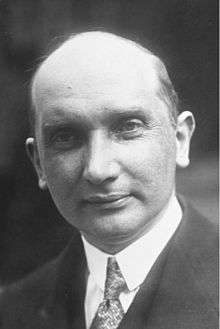 |
August Zaleski (1883–1972) |
9 June 1947 | 8 April 1972 | Independent | From 1954 onwards, opposed by the Rada Trzech (Three-Man Council). |
| 3 (6) | 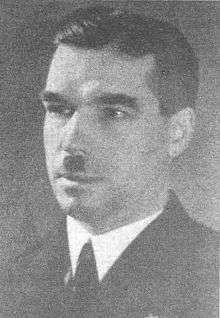 |
Stanisław Ostrowski (1892–1982) |
9 April 1972 | 24 March 1979 | Independent | |
| 4 (7) | 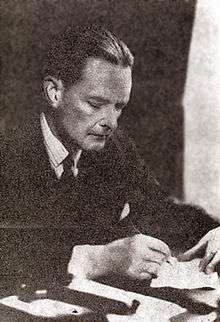 |
Edward Raczyński (1891–1993) |
8 April 1979 | 8 April 1986 | Independent | |
| 5 (8) |  |
Kazimierz Sabbat (1913–1989) |
8 April 1986 | 19 July 1989 | Independent | |
| 6 (9) | |
Ryszard Kaczorowski (1919–2010) |
19 July 1989 | 22 December 1990 | Independent | Kaczorowski resigned on 22 December 1990, upon the election of Lech Wałęsa as President of the Republic of Poland. |
People's Republic of Poland (1944–1989)
President of the Presidium of the Popular Council
The People's Republic of Poland was founded under Soviet protection on 31 December 1944 and recognized by the United States and the United Kingdom since 6 July 1945.
| № | Portrait | Name (Birth–Death) |
Took office | Left office | Political Party | Notes |
|---|---|---|---|---|---|---|
| 1 | .jpg) |
Bolesław Bierut (1892–1956) |
31 December 1944 | 5 February 1947 | Polish Workers' Party |
President of the Republic
| № | Portrait | Name (Birth–Death) |
Took office | Left office | Political Party | Notes |
|---|---|---|---|---|---|---|
| 1 | .jpg) |
Bolesław Bierut (1892–1956) |
5 February 1947 | 20 November 1952 | Polish United Workers' Party | From December 1948, also Secretary General of the Polish United Workers' Party. |
Chairman of the Council of State
In 1952, the July Constitution abolished the office of president and made the Council of State the collective head of state, chairmen of which are listed below. Real power rested with the Polish United Workers' Party (PZPR), its Central Committee and its secretary general/first secretary.
| № | Portrait | Name (Birth–Death) |
Took office | Left office | Political Party | Notes |
|---|---|---|---|---|---|---|
| 1 | 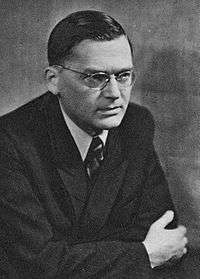 |
Aleksander Zawadzki (1899–1964) |
20 November 1952 | 7 August 1964 | Polish United Workers' Party | Died in office (cancer). |
| 2 | .jpg) |
Edward Ochab (1906–1989) |
12 August 1964 | 10 April 1968 | Polish United Workers' Party | |
| 3 | 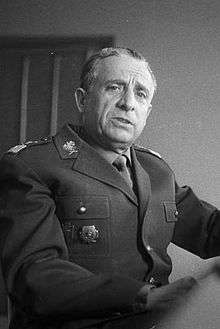 |
Marian Spychalski (1906–1980) |
10 April 1968 | 23 December 1970 | Polish United Workers' Party | |
| 4 | 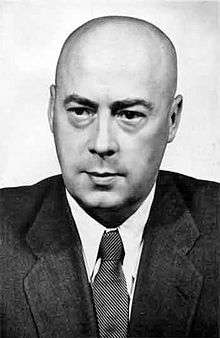 |
Józef Cyrankiewicz (1911–1989) |
23 December 1970 | 28 March 1972 | Polish United Workers' Party | |
| 5 | 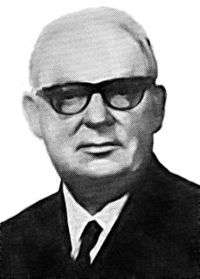 |
Henryk Jabłoński (1909–2003) |
28 March 1972 | 6 November 1985 | Polish United Workers' Party | |
| 6 | 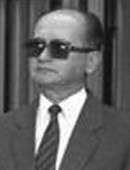 |
Wojciech Jaruzelski (1923–2014) |
6 November 1985 | 19 July 1989 | Polish United Workers' Party | Also, the First Secretary of the Polish United Workers' Party. |
President of the Republic
| № | Portrait | Name (Birth–Death) |
Took office | Left office | Political Party | Notes |
|---|---|---|---|---|---|---|
| 1 |  |
Wojciech Jaruzelski (1923–2014) |
19 July 1989 | 31 December 1989 | Polish United Workers' Party | Following the Polish Round Table Agreement between Polish United Workers' Party and Solidarity, the Council of State was abolished. Its chairman was elected President of the People's Republic by the Parliament. |
First Secretaries of the Polish United Workers' Party
From 1954 the head of the party was also the Chairman of the Central Committee:
| No. | Name (Birth–Death) |
Picture | Took office | Left office | Notes |
|---|---|---|---|---|---|
| 1 | Bolesław Bierut (1892–1956) | .jpg) | December 22, 1948 | March 12, 1956 | Secretary General |
| 2 | Edward Ochab (1906–1989) | .jpg) | March 20, 1956 | October 21, 1956 | First Secretary |
| 3 | Władysław Gomułka (1905–1982) | 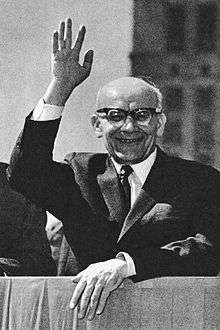 | October 21, 1956 | December 20, 1970 | First Secretary |
| 4 | Edward Gierek (1913–2001) | 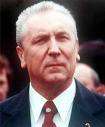 | December 20, 1970 | September 6, 1980 | First Secretary |
| 5 | Stanisław Kania (1927–) |  | September 6, 1980 | October 18, 1981 | First Secretary |
| 6 | Wojciech Jaruzelski (1923–2014) |  | October 18, 1981 | July 29, 1989 | First Secretary |
| 7 | Mieczysław Rakowski (1926–2008) | 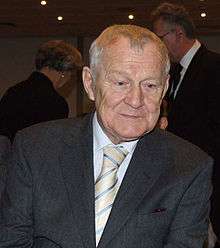 | July 29, 1989 | January 29, 1990 | First Secretary |
Republic of Poland (1989–present)
President of the Republic
| № | Portrait | Name (Birth–Death) |
Took office | Left office | Political Party | Notes Previous office |
|---|---|---|---|---|---|---|
| — |  |
Wojciech Jaruzelski (1923–2014) |
31 December 1989 | 22 December 1990 | Independent | Chairman of the Council of State (1985–89) and President of the People's Republic (1989), when the state name was changed to Republic of Poland on 31 December 1989, the office was renamed accordingly. |
| 4 | 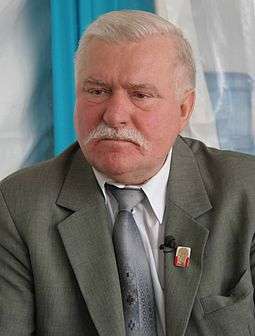 |
Lech Wałęsa (1943–) |
22 December 1990 | 22 December 1995 | Solidarity | Elected 1990, the first President elected by popular vote. |
| 5 |  |
Aleksander Kwaśniewski (1954–) |
23 December 1995 | 23 December 2000 | Social Democracy | Member of the Sejm (1991–95); elected 1995 |
| 23 December 2000 | 23 December 2005 | Independent | 2000, the first President of Third Republic elected twice. | |||
| 6 | 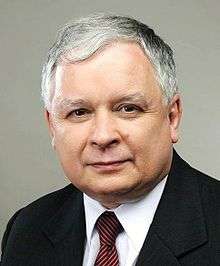 |
Lech Kaczyński (1949–2010) |
23 December 2005 | 10 April 2010 | Law and Justice | Member of the Sejm (1991–93 and 2001–05); elected 2005. Died in an airplane crash, which also claimed the life of the last President of the Government-in-Exile, Ryszard Kaczorowski. |
| — | 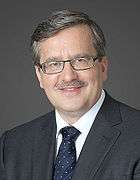 |
Bronisław Komorowski (1952–) Acting President |
10 April 2010 | 8 July 2010 | Civic Platform | Marshal of the Sejm. Resigned as Acting President in order to run as a candidate in the 2010 Presidential election. |
| — | 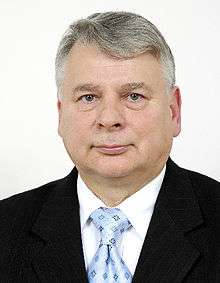 |
Bogdan Borusewicz (1949–) Acting President |
8 July 2010 | 8 July 2010 | Civic Platform | Marshal of the Senate. |
| — |  |
Grzegorz Schetyna (1963–) Acting President |
8 July 2010 | 6 August 2010 | Civic Platform | Marshal of the Sejm. Served as Acting President until the 2010 Presidential election. |
| 7 |  |
Bronisław Komorowski (1952–) |
6 August 2010 | 6 August 2015 | Civic Platform | Member of the Sejm (1991–2010), Marshal of the Sejm (2007–10); acting (2010); elected 2010. |
| 8 | |
Andrzej Duda (1972–) |
6 August 2015 | Incumbent | Law and Justice | Member of the Sejm (2011–14), Member of the European Parliament (2014–15); elected 2015. |
See also
- Polish presidential election, 1990
- Polish presidential election, 1995
- Polish presidential election, 2000
- Polish presidential election, 2005
- Polish presidential election, 2010
- Polish presidential election, 2015
- List of Prime Ministers of Poland
- List of Polish monarchs
